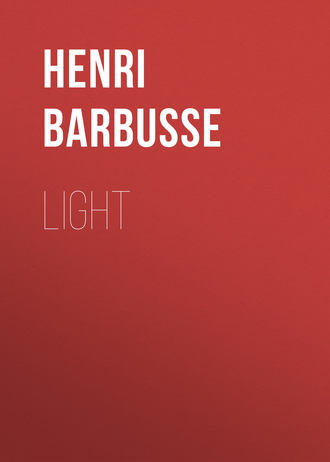 полная версия
полная версияLight
But what shall we say? Let us spell out the Magna Charta of which we humbly catch sight. Let us say to the people of whom all peoples are made: "Wake up and understand, look and see; and having begun again the consciousness which was mown down by slavery, decide that everything must be begun again!"
Begin again, entirely. Yes, that first. If the human charter does not re-create everything, it will create nothing.
Unless they are universal, the reforms to be carried out are utopian and mortal. National reforms are only fragments of reforms. There must be no half measures. Half measures are laughter-provoking in their unbounded littleness when it is a question for the last time of arresting the world's roll down the hill of horror. There must be no half measures because there are no half truths. Do all, or you will do nothing.
Above all, do not let the reforms be undertaken by the Kings. That is the gravest thing to be taught you. The overtures of liberality made by the masters who have made the world what it is are only comedies. They are only ways of blockading completely the progress to come, of building up the past again behind new patchwork of plaster.
Never listen, either, to the fine words they offer you, the letters of which you see like dry bones on hoardings and the fronts of buildings. There are official proclamations, full of the notion of liberty and rights, which would be beautiful if they said truly what they say. But they who compose them do not attach their full meaning to the words. What they recite they are not capable of wanting, nor even of understanding. The one indisputable sign of progress in ideas to-day is that there are things which they dare no longer leave publicly unsaid, and that's all. There are not all the political parties that there seem to be. They swarm, certainly, as numerous as the cases of short sight; but there are only two—the democrats and the conservatives. Every political deed ends fatally either in one or the other, and all their leaders have always a tendency to act in the direction of reaction. Beware, and never forget that if certain assertions are made by certain lips, that is a sufficient reason why you should at once mistrust them. When the bleached old republicans10 take your cause in their hands, be quite sure that it is not yours. Be wary as lions.
Do not let the simplicity of the new world out of your sight. The social trust is simple. The complications are in what is overhead—the accumulation of delusions and prejudice heaped up by ages of tyrants, parasites, and lawyers. That conviction sheds a real glimmer of light on your duty and points out the way to accomplish it. He who would dig right down to the truth must simplify; his faith must be brutally simple, or he is lost. Laugh at the subtle shades and distinctions of the rhetoricians and the specialist physicians. Say aloud: "This is what is," and then, "That is what must be."
You will never have that simplicity, you people of the world, if you do not seize it. If you want it, do it yourself with your own hands. And I give you now the talisman, the wonderful magic word—you can!
That you may be a judge of existing things, go back to their origins, and get at the endings of all. The noblest and most fruitful work of the human intelligence is to make a clean sweep of every enforced idea—of advantages or meanings—and to go right through appearances in search of the eternal bases. Thus you will clearly see the moral law at the beginning of all things, and the conception of justice and equality will appear to you beautiful as daylight.
Strong in that supreme simplicity, you shall say: I am the people of the peoples; therefore I am the King of Kings, and I will that sovereignty flows everywhere from me, since I am might and right. I want no more despots, confessed or otherwise, great or little; I know, and I want no more. The incomplete liberation of 1789 was attacked by the Kings. Complete liberation will attack the Kings.
But Kings are not exclusively the uniformed ones among the trumpery wares of the courts. Assuredly, the nations who have a King have more tradition and subjection than the others. But there are countries where no man can get up and say, "My people, my army," nations which only experience the continuation of the kingly tradition in more peaceful intensity. There are others with the great figures of democratic leaders; but as long as the entirety of things is not overthrown—always the entirety, the sacred entirety—these men cannot achieve the impossible, and sooner or later their too-beautiful inclinations will be isolated and misunderstood. In the formidable urgency of progress, what do the proportions matter to you of the elements which make up the old order of things in the world? All the governors cling fatally together among themselves, and more solidly than you think, through the old machine of chancelleries, ministries, diplomacy, and the ceremonials with gilded swords; and when they are bent on making war for themselves there is an unquenchable likeness between them all, of which you want no more. Break the chain; suppress all privileges, and say at last, "Let, there be equality."
One man is as good as another. That means that no man carries within himself any privilege which puts him above the universal law. It means an equality in principle, and that does not invalidate the legitimacy of the differences due to work, to talent, and to moral sense. The leveling only affects the rights of the citizen; and not the man as a whole. You do not create the living being; you do not fashion the living clay, as God did in the Bible; you make regulations. Individual worth, on which some pretend to rely, is relative and unstable, and no one is a judge of it. In a well-organized entirety, it cultivates and improves itself automatically. But that magnificent anarchy cannot, at the inception of the human Charter, take the place of the obviousness of equality.
The poor man, the proletarian, is nobler than another, but not more sacred. In truth, all workers and all honest men are as good as each other. But the poor, the exploited, are fifteen hundred millions here on earth. They are the Law because they are the Number. The moral law is only the imperative preparation of the common good. It always involves, in different forms, the necessary limitations of some individual interests by the rest; that is to say, the sacrifice of one to the many, of the many to the whole. The republican conception is the civic translation of the moral law; what is anti-republican is immoral.
Socially, women are the equals of men, without restrictions. The beings who shine and who bring forth are not made solely to lend or to give the heat of their bodies. It is right that the sum total of work should be shared, reduced and harmonized by their hands. It is just that the fate of humanity should be grounded also in the strength of women. Whatever the danger which their instinctive love of shining things may occasion, in spite of the facility with which they color all things with their own feelings and the totality of their slightest impulses—the legend of their incapacity is a fog that you will dissipate with a gesture of your hands. Their advent is in the order of things; and it is also in order to await with hopeful heart the day when the social and political chains of women will fall off, when human liberty will suddenly become twice as great.
People of the world, establish equality right up to the limits of your great life. Lay the foundations of the republic of republics over all the area where you breathe; that is to say, the common control in broad daylight of all external affairs, of community in the laws of labor, of production and of commerce. The subdivision of these high social and moral arrangements by nations or by limited unions of nations (enlargements which are reductions) is artificial, arbitrary, and malignant. The so-called inseparable cohesions of national interests vanish away as soon as you draw near to examine them. There are individual interests and a general interest, those two only. When you say "I," it means "I"; when you say "We," it means Man. So long as a single and identical Republic does not cover the world, all national liberations can only be beginnings and signals!
Thus you will disarm the "fatherlands" and "motherlands," and you will reduce the notion of Motherland to the little bit of social importance that it must have. You will do away with the military frontiers, and those economic and commercial barriers which are still worse. Protection introduces violence into the expansion of labor; like militarism, it brings in a fatal absence of balance. You will suppress that which justifies among nations the things which among individuals we call murder, robbery, and unfair competition. You will suppress battles—not nearly so much by the direct measure of supervision and order that you will take as because you will suppress the causes of battle. You will suppress them chiefly because it is you who will do it, by yourself, everywhere, with your invincible strength and the lucid conscience that is free from selfish motives. You will not make war on yourself.
You will not be afraid of magic formulas and the churches. Your giant reason will destroy the idol which suffocates its true believers. You will salute the flags for the last time; to that ancient enthusiasm which flattered the puerility of your ancestors, you will say a peaceful and final farewell. In some corners of the calamities of the past, there were times of tender emotion; but truth is greater, and there are not more boundaries on the earth than on the sea!
Each country will be a moral force, and no longer a brutal force; while all brutal forces clash with themselves, all moral forces make mighty harmony together.
The universal republic is the inevitable consequence of equal rights in life for all. Start from the principle of equality, and you arrive at the people's international. If you do not arrive there it is because you have not reasoned aright. They who start from the opposite point of view—God, and the divine rights of popes and Kings and nobles, and authority and tradition—will come, by fabulous paths but quite logically, to opposite conclusions. You must not cease to hold that there are only two teachings face to face. All things are amenable to reason, the supreme Reason which mutilated humanity, wounded in the eyes, has deified among the clouds.
* * * * * *You will do away with the rights of the dead, and with heredity of power, whatever it may be, that inheritance which is unjust in all its gradations, for tradition takes root there, and it is an outrage on equality, against the order of labor. Labor is a great civic deed which all men and all women without exception must share or go down. Such divisions will reduce it for each one to dignified proportions and prevent it from devouring human lives.
You will not permit colonial ownership by States, which makes stains on the map of the world and is not justified by confessable reasons; and you will organize the abolition of that collective slavery. You will allow the individual property of the living to stand. It is equitable because its necessity is inherent in the circumstances of the living, and because there are cases where you cannot tear away the right of ownership without tearing right itself. Besides, the love of things is a passion, like the love of beings. The object of social organization is not to destroy sentiment and pleasure, but on the contrary to allow them to flourish, within the limit of not wronging others. It is right to enjoy what you have clearly earned by your work. That focused wisdom alone bursts among the old order of things like a curse.
Chase away forever, everywhere, everywhere, the bad masters of the sacred school. Knowledge incessantly remakes the whole of civilization. The child's intelligence is too precious not to be under the protection of all. The heads of families are not free to deal according to their caprices with the ignorance which each child brings into the daylight; they have not that liberty contrary to liberty. A child does not belong body and soul to its parents; it is a person, and our ears are wounded by the blasphemy—a residue of despotic Roman tradition—of those who speak of their sons killed in the war and say, "I have given my son." You do not give living beings—and all intelligence belongs primarily to reason.
There must no longer be a single school where they teach idolatry, where the wills of to-morrow grow bigger under the terror of a God who does not exist, and on whom so many bad arguments are thrown away or justified. Nowhere must there be any more school-books where they dress up in some finery of prestige what is most contemptible and debasing in the past of the nations. Let there be nothing but universal histories, nothing but the great lines and peaks, the lights and shadows of that chaos which for six thousand years has been the fortune of two hundred thousand millions of men.
You will suppress everywhere the advertising of the cults, you will wipe away the inky uniform of the parsons. Let every believer keep his religion for himself, and let the priests stay between walls. Toleration in face of error is a graver error. One might have dreamed of a wise and universal church, for Jesus Christ will be justified in His human teaching as long as there are hearts. But they who have taken His morality in hand and fabricated their religion have poisoned the truth; more, they have shown for two thousand years that they place the interests of their caste before those of the sacred law of what is right. No words, no figures can ever give an idea of the evil which the Church has done to mankind. When she is not the oppressor herself, upholding the right of force, she lends her authority to the oppressors and sanctifies their pretenses; and still to-day she is closely united everywhere with those who do not want the reign of the poor. Just as the Jingoes invoke the charm of the domestic cradle that they may give an impulse to war, so does the Church invoke the poetry of the Gospels; but she has become an aristocratic party like the rest, in which every gesture of the sign of the Cross is a slap in the Face of Jesus Christ. Out of the love of one's native soil, they have made Nationalists; out of Jesus they have made Jesuits.
Only international greatness will at last permit the rooting up of the stubborn abuses which the partition walls of nationality multiply, entangle and solidify. The future Charter—of which we confusedly glimpse some signs and which has for its premises the great moral principles restored to their place, and the multitude at last restored to theirs—will force the newspapers to confess all their resources. By means of a young language, simple and modest, it will unite all foreigners—those prisoners of themselves. It will mow down the hateful complexity of judicial procedure, with its booty for the somebodies, and its lawyers as well, who intrude the tricks of diplomacy and the melodramatic usages of eloquence into the plain and simple machinery of justice. The righteous man must go so far as to say that clemency has not its place in justice; the logical majesty of the sentence which condemns the guilty one in order to frighten possible evil-doers (and never for another reason) is itself beyond forgiveness. International dignity will close the taverns, forbid the sale of poisons, and will reduce to impotence the vendors who want to render abortive, in men and young people, the future's beauty and the reign of intelligence. And here is a mandate which appears before my eyes—the tenacious law which must pounce without respite on all public robbers, on all those, little and big, cynics and hypocrites, who, when their trade or their functions bring the opportunity, exploit misery and speculate on necessity. There is a new hierarchy to make mistakes, to commit offenses and crimes—the true one.
You can form no idea of the beauty that is possible! You cannot imagine what all the squandered treasure can provide, what can be brought on by the resurrection of misguided human intelligence, successively smothered and slain hitherto by infamous slavery, by the despicable infectious necessity of armed attack and defense, and by the privileges which debase human worth. You can have no notion what human intelligence may one day find of new adoration. The people's absolute reign will give to literature and the arts—whose harmonious shape is still but roughly sketched—a splendor boundless as the rest. National cliques cultivate narrowness and ignorance, they cause originality to waste away; and the national academies, to which a residue of superstition lends respect, are only pompous ways of upholding ruins. The domes of those Institutes which look so grand when they tower above you are as ridiculous as extinguishers. You must widen and internationalize, without pause or limit, all which permits of it. With its barriers collapsed, you must fill society with broad daylight and magnificent spaces; with patience and heroism must you clear the ways which lead from the individual to humanity, the ways which were stopped up with corpses of ideas and with stone images all along their great curving horizons. Let everything be remade on simple lines. There is only one people, there is only one people!
If you do that, you will be able to say that, at the moment when you planned your effort and took your decision, you saved the human species as far as it is possible on earth to do it. You will not have brought happiness about. The fallacy-mongers do not frighten us when they preach resignation and paralysis on the plea that no social change can bring happiness, thus trifling with these profound things. Happiness is part of the inner life, it is an intimate and personal paradise; it is a flash of chance or genius which comes sweetly to life among those who elbow each other, and it is also the sense of glory. No, it is not in your hands, and so it is in nobody's hands. But a balanced and heedful life is necessary to man, that he may build the isolated home of happiness; and death is the fearful connection of the happenings which pass away along with our profundities. External things and those which are hidden are essentially different, but they are held together by peace and by death.
To accomplish the majestically practical work, to shape the whole architecture like a statue, base nothing on impossible modifications of human nature; await nothing from pity.
Charity is a privilege, and must disappear. For the rest, you cannot love unknown people any more than you can have pity on them. The human intelligence is made for infinity; the heart is not. The being who really suffers in his heart, and not merely in his mind or in words, by the suffering of others whom he neither sees nor touches, is a nervous abnormality, and he cannot be argued from as an example. The repulse of reason, the stain of absurdity, torture the intelligence in a more abundant way. Simple as it may be, social science is geometry. Do not accept the sentimental meaning they give to the word "humanitarianism," and say that the preaching of fraternity and love is vain; these words lose their meaning amid the great numbers of man. It is in this disordered confusion of feelings and ideas that one feels the presence of Utopia. Mutual solidarity is of the intellect—common-sense, logic, methodical precision, order without faltering, the ruthless inevitable perfection of light!
In my fervor, in my hunger, and from the depths of my abyss, I uttered these words aloud amid the silence. My great reverie was blended with song, like the Ninth Symphony.
* * * * * *I am resting on my elbows at the window. I am looking at the night, which is everywhere, which touches me, me, although I am only I, and it is infinite night. It seems to me that there is nothing else left me to think about. Things cling together; they will save each other, and will do their setting in order.
But again I am seized by the sharpest of my agonies—I am afraid that the multitude may rest content with the partial gratifications to be granted them everywhere by those who will use all their clinging, cunning power to prevent the people from understanding, and then from wishing. On the day of victory, they will pour intoxication and dazzling deceptions into you, and put almost superhuman cries into your mouths, "We have delivered humanity; we are the soldiers of the Right!" without telling you all that such a statement includes of gravity, of immense pledges and constructive genius, what it involves in respect for great peoples, whoever they are, and of gratitude to those who are trying to deliver themselves. They will again take up their eternal mission of stupefying the great conscious forces, and turning them aside from their ends. They will appeal for union and peace and patience, to the opportunism of changes, to the danger of going too quickly, or of meddling in your neighbor's affairs, and all the other fallacies of the sort. They will try again to ridicule and strike down those whom the newspapers (the ones in their pay) call dreamers, sectarians, and traitors; once again they will flourish all their old talismans. Doubtless they will propose, in the fashionable words of the moment, some official parodies of international justice, which they will break up one day like theatrical scenery; they will enunciate some popular right, curtailed by childish restrictions and monstrous definitions, resembling a brigand's code of honor. The wrong torn from confessed autocracies will hatch out elsewhere—in the sham republics, and the self-styled liberal countries who have played a hidden game. The concessions they will make will clothe the old rotten autocracy again, and perpetuate it. One imperialism will replace the other, and the generations to come will be marked for the sword. Soldier, wherever you are, they will try to efface your memory, or to exploit it, by leading it astray, and forgetfulness of the truth is the first form of your adversity! May neither defeat nor victory be against you. You are above both of them, for you are all the people.
The skies are peopled with stars, a harmony which clasps reason close, and applies the mind to the adorable idea of universal unity. Must that harmony give us hope or misgiving?
We are in a great night of the world. The thing is to know if we shall wake up to-morrow. We have only one succor—we know of what the night is made. But shall we be able to impart our lucid faith, seeing that the heralds of warning are everywhere few, and that the greatest victims hate the only ideal which is not one, and call it utopian? Public opinion floats over the surface of the peoples, wavering and submissive to the wind; it lends but fleeting conscience and conviction to the majority; it cries "Down with the reformers!" It cries "Sacrilege!" because it is made to see in its vague thoughts what it could not itself see there. It cries that they are distorting it, whereas they are enlarging it.
I am not afraid, as many are, and as I once was myself, of being reviled and slandered. I do not cling to respect and gratitude for myself. But if I succeed in reaching men, I should like them not to curse me. Why should they, since it is not for myself? It is only because I am sure I am right. I am sure of the principles I see at the source of all—justice, logic, equality; all those divinely human truths whose contrast with the realized truth of to-day is so heart-breaking. And I want to appeal to you all; and that confidence which fills me with a tragic joy, I want to give it to you, at once as a command and as a prayer. There are not several ways of attaining it athwart everything, and of fastening life and the truth together again; there is only one—right-doing. Let rule begin again with the sublime control of the intellect. I am a man like the rest, a man like you. You who shake your head or shrug your shoulders as you listen to me—why are we, we two, we all, so foreign to each other, when we are not foreign?
I believe, in spite of all, in truth's victory. I believe in the momentous value, hereafter inviolable, of those few truly fraternal men in all the countries of the world, who, in the oscillation of national egoisms let loose, stand up and stand out, steadfast as the glorious statues of Right and Duty. To-night I believe—nay, I am certain—that the new order will be built upon that archipelago of men. Even if we have still to suffer as far as we can see ahead, the idea can no more cease to throb and grow stronger than the human heart can; and the will which is already rising here and there they can no longer destroy.







